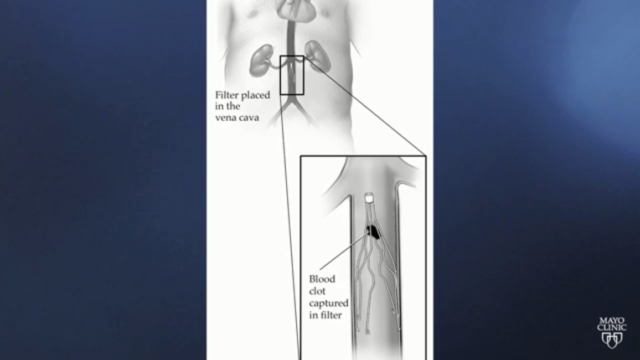
A deep vein thrombosis (DVT) is a blood clot in a vein, usually in the leg. A clot can happen if you have certain medical conditions that affect how your blood clots, or if you don’t move around for a long time, such as on a long airplane ride or after surgery.
First line treatments are blood thinners or clot busting medications. But some people are not able to take those medications. If so, they may have a filter placed to prevent the clot from breaking off and traveling to the lungs.
In this Mayo Clinic Minute, Dr. Erica Knavel Koepsel, a Mayo Clinic interventional radiologist, explains why the filters may not be the best choice for some people.
An inferior vena cava (IVC) filter is a device designed to block blood clots in a vein — usually in the leg — from migrating to the lung. It’s a situation that can be life-threatening.
“People who tend to get DVT, or blood clots, are people who may have had recent surgery, people who may have malignancy or cancer, or other sorts of disease that would make them relatively immobile,” says Dr. Knavel Koepsel.
People with blood clotting disorders are also at risk.
Dr. Knavel Koepsel says they are learning that IVC filters are not perfect, and some should be removed when no longer needed.
“The most common problems we see are that the filters themselves can fracture, the pieces can migrate or the filter itself can migrate. Also, the filter, because it’s a foreign body, can cause an extensive scar formation reaction in the inferior vena cava, which leads to narrowing of the inferior vena cava and sometimes even occlusion or total blockage,” says Dr. Knavel Koepsel.
She recommends anyone with an IVC filter should talk to their health care provider about the risks and benefits of the device.
‘Courtesy: Mayo Clinic News Network.’[/vc_message]












